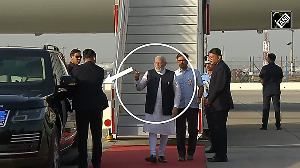The first meeting between the domestic and foreign lenders of the beleaguered Dabhol Power Company after the Manmohan Singh government assumed office remained inconclusive. The lenders are likely to meet again on Friday.
"The two sides made progress in the discussions but no final decision has been made. They will in all probability meet on Friday," sources familiar with the development said.
The meeting was also attended by the United States government agency the Overseas Private Investment Corporation, which has the twin role of lender and political insurer in the project.
The Mumbai meeting is the third in about the last one and a half months following the ones in Singapore and London.
Domestic lenders led by the Industrial Development Bank of India, which have an exposure of around Rs 6,300 crore (Rs 63 billion) to the project, are trying to buy out the foreign lenders exposure of around $ 372 million at a substantial discount.
The domestic lenders are keen on buying out the foreign lenders exposure at a 40 per cent discount at the last count, while the foreign lenders are not keen on settling for anything more than a 30 per cent discount.
The hectic efforts to find a solution comes in the face of General Electric and Bechtel acquiring the bankrupt US company Enron Corp's 65 per cent stake in the Dabhol Power Company through a complex three tiered transaction.
The stake in DPC is however pledged with the lenders which also have the first charge on the assets.
Meanwhile PTI reports that renowned economist and front-runner for the top slot at Planning Commission, Arjun Sengupta on Thursday said it was a mistake to have extended counter guarantees to the controversial Dabhol Power Project.
Sengupta, who was member secretary of the plan panel then, said at a round table conference here, "It was a mistake to give counter guarantees because the numbers were wrong."
He said that he had strongly favoured government assuming political risk associated with Dabhol, billed as the single largest foreign direct investment project.
"Some of us maintained categorically that if a company says it is facing risks due to government policy then those risks must be shared," he said, adding government must be willing to compensate for these risks.
Sengupta said the erstwhile promoters of the project had cited risks arising out of the inability to sell power directly to customers owing to legislative hurdles.
The $3 billion project initially promoted by now bankrupt Enron group has been lying defunct since mid 2001 following financial difficulties with the Maharashtra State Electricity Board.
The 740 mw naphtha-fired plant was 65 per cent owned by Enron with state electricity board and GE and Bechtel owning the rest.
However, following a recent order by a US court, the other two foreign promoters have acquired Enron's 49 per cent stake and are in the process of acquiring the residual stake while domestic and foreign lenders continue to wrangle over sorting out the debt issues.
The Indian government has constituted a high powered committee under former cabinet secretary Naresh Chandra to sort out the matter.







 © 2025
© 2025